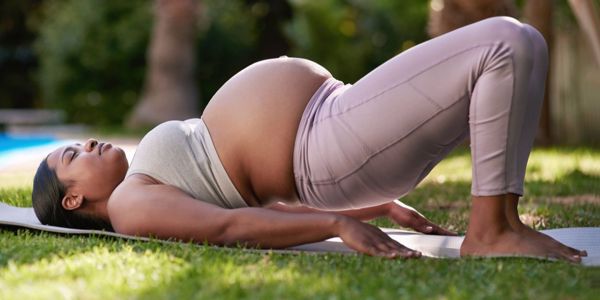Pregnancy is known to slowwww things downnnnn, most commonly, your digestion process. Constipation is one of the most frequently reported pregnancy symptoms that lasts all pregnancy long. In many cases, the best and easiest solution is to increase hydration, so if drinking enough water is difficult for you, these two things might be tied together.
When asking clients if they have regular bowel movements, they often say it is “regular for them.” Usually, the people who say this have previous digestion issues and live their lives in a somewhat constipated state. If this is you, that can be normal for pregnancy. Ideally, we are getting you to a place where pooping is easy, and we are not feeling discomfort due to bloat or constipation, just from a baby sitting on all of our guts.
Dehydration
The first offender of constipation in pregnancy is dehydration or not getting enough water and fluids. Sometimes, water does not seem to taste good in pregnancy. Other times, people are so sick they cannot keep it down. If fluids are unable to be kept down, now is the time to get IV therapy. Whether you pay for an IV therapy service to come to your home, go to the ER, or contact your care provider and have them give you IV therapy, you must get fluids and keep them down.
Our aim for proper hydration in pregnancy should be around 90oz or your body weight in half ounces. I also tell people to pay attention to their urine output. Is it bright yellow or even brown? This is a really good sign that you need more fluids. Sometimes, drinking plain water can be difficult, so here are my best tips.
First, get a super cute water bottle, decorate it with stickers, and make it something you love carrying around. Second, get fluids in different ways. You can add fruit to infuse into your water, add a packet of Liquid IV or other electrolytes, drink coconut water, drink tea, or even broth. All these add to your fluid intake, and drinking broth also adds to your nutrient intake, which is a double win!
Fiber
If hydration is up to par and you are still getting constipation issues, the next thing I like to look at is the amount of fiber you are taking in. We often think we are getting enough fiber, but we are not even close. I lived with constant constipation for over seven years until someone told me that my proper amount of fiber likely was not enough. Because of this knowledge, I recommend getting closer to 50-70g of fiber daily. Yep, I know, that is a LOT of fiber. You can help with this by taking a daily fiber supplement, especially if keeping food down is hard. Eating something with fiber and protein is the best way to snack, especially in early pregnancy, when trying to combat morning sickness.
Exercise
Another big player in the bowels moving regularly is exercise and movement. You do not need to do wild athletic exercises to combat constipation; a simple walk or swim usually does the trick. Like many ailments in pregnancy, body movement can solve some of the constipation you have been experiencing. I find that 30-60 minutes of moving my body daily makes for more regular bowel movements.
Simply click here and enter your details for your chance to win a $250 Amazon spend today!
What Else Could It Be?
If we have ruled out fiber intake, exercise, and water intake as the issue causing your constipation, then it is time to look into other things.
Sometimes, the amount of iron in your prenatal vitamin is enough to stop things up. You can try to find a prenatal vitamin without iron in it and see how that impacts your bowels. Another thought would be to add supplementation like Slippery Elm or Magnesium. If you are going to add these supplements, you must talk with your care provider first to make sure they are safe for your body.
I know first-hand how the body sometimes needs a little push to get things moving. You do not need to suffer if you have difficulty in the bathroom. Talk to your care provider about it, no matter how embarrassed you feel. More than likely, you are not alone, and they have a lot of tips and tricks for smoother bowel movements during pregnancy.







